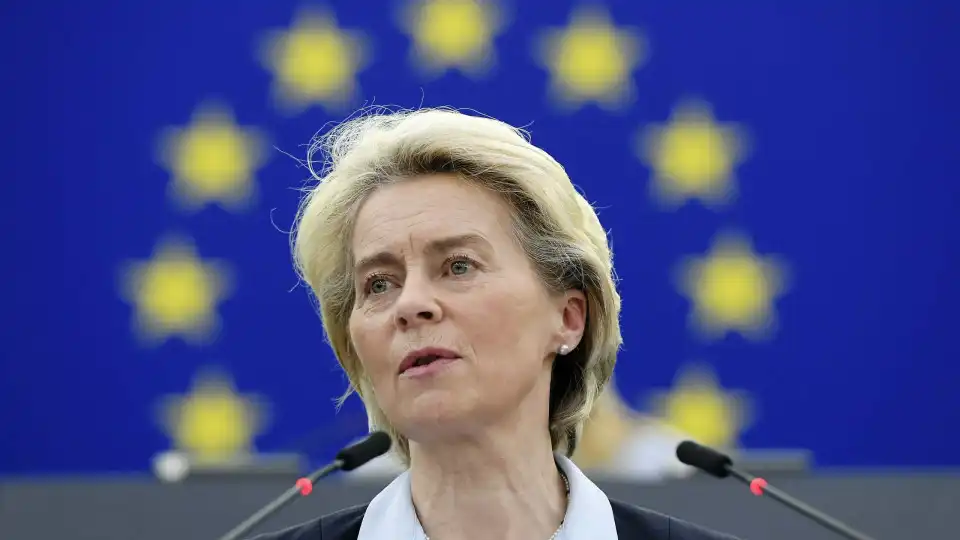Von der Leyen redrafts "red lines" with radical right in "moderation"
European Commission President Ursula von der Leyen has made working with parties to her right that drop their anti-Europeanism and defense of Russia a campaign promise for the European elections, as some of them moderate their positions with an eye on power, analysts say.

© FREDERICK FLORIN/AFP via Getty Images

Mundo Comissão Europeia
Sophia Russack, from the Centre for European Policy Studies (CEPS), told Lusa that there is a trend towards moderation on the part of the European Conservatives and Reformists (ECR), a group of parties that could be encouraged after von der Leyen, re-nominated by the European People's Party (EPP, centre-right), admitted that she is available to dialogue with those who meet certain criteria, pointing to Italian Prime Minister Giorgia Meloni (Brothers of Italy), as an example of someone on her right with whom to work.
Far-right parties in the countries of the European Union (EU) are part of one of two political groups: Identity and Democracy (ID) and the ECR. The heterogeneous parties that make up these political groups range, for example, from Euroscepticism to Europeanism, unequivocally supporting Ukraine and being close to the Kremlin.
"I think the ECR and the parties that remain in the ECR have ended up moderating themselves more and more and will be increasingly divergent [from the ID], perhaps [...]. But the line that today separates the ECR and the ID is blurred", said Sophia Russack.
Ursula von der Leyen has established three "red lines" for the EPP to dialogue with other political groups (including the far right): a Europeanist vision, a pro-Ukrainian position and compliance with the rule of law. Her main opponent, Christian Schmit (Socialists and Democrats), rejected any understanding with parties to the right of the EPP.
The researcher believes that von der Leyen "will turn a blind eye" to compliance with the rule of law and argued that this stance is already visible in her relationship with Meloni, a conservative and critic of the support given to immigrants and refugees.
Just over two weeks before the elections for the European Parliament (EP), the Alternative for Germany (AfD) delegation was expelled from the Identity and Democracy (ID) party group on Thursday, after the leader of the German far-right party, Maximilian Krah, said that it was incorrect to call all members of the former Nazi paramilitary organisation SS (Schutzstaffel) "criminals".
The decision led to Krah's resignation, but it could also be the beginning of a fragmentation on the far right in the European Parliament, which is already struggling to find consensus.
But the AfD, which is still without a political group today, was not the only party to leave its political family. Fidesz - Hungarian Civic Union, the party of Hungarian Prime Minister Viktor Orbán, left the EPP in March 2021 after the parties that made up this political group approved its suspension due to its Eurosceptic positions, against support for Ukraine and Orbán's closeness to Russian President Vladimir Putin.
"This is all very difficult to predict, but there are far-right parties that want to moderate their discourse because they have realised that it is the only path to power", added Sophia Russack.
"There may even be three groups [of the far right] already", admitted the researcher, recognising, however, that, for example, for the AfD or Fidesz to create another political group "they need six more partners".
Without making predictions, but analysing the evolution of the political-ideological dynamic, Sophia Russack envisages that there could be "those on the far right who are further away" from the EU, "who are pro-Russia and very, very anti-European".
At the same time, there could be another group made up of parties that "are more protectionist on the right" and that "are only critical of the EU" without verbalising opposition to the decisions of the community bloc.
A "healthy economy" could also define the way in which certain far-right parties will position themselves, in this case, closer to the ECR, which has been moving towards moderation in order to be able to 'come into play' in decisions with the EPP.
"All of this depends a lot on how the individual parties act, whether they are moving towards moderation or radicalisation in the next term and how the groups change after the elections", concluded Sophia Russack.
Zselyke Csaky, a researcher at the Centre for European Reform, agrees and recognises that there has been "a lot of movement on the right, with parties like Germany's AfD moving from the far-right ECR to join the far-right ID or Hungary's Fidesz being expelled into the political wilderness".
Read Also: AI brings "many opportunities" but risk of "democratising disinformation" (Portuguese version)


Descarregue a nossa App gratuita.
Oitavo ano consecutivo Escolha do Consumidor para Imprensa Online e eleito o produto do ano 2024.
* Estudo da e Netsonda, nov. e dez. 2023 produtodoano- pt.com



